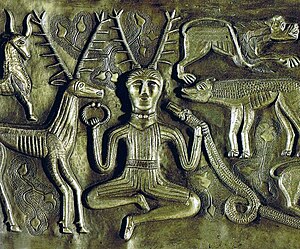Wings, yes, horns, never.
Mind you, the chance of your spotting a Viking wearing any sort of helmet isn't that great.
Still, those horns on Viking helenets. Where did the idea of them come from? Well, it seems we can blame the costume designer Carl Emil Doepler, who created the horned helmet 140 years ago for the first production of Wagner's Der Ring des Nibelungen.
So where can we find a horn?
On sheep, cows, goats, and rhinos, for a start. There are horned lizards:

and a horned viper, and a horned owl, too:

photo by Anton Bielousov
Or how about that strangest of all beasts, the orchestra?

Orchestra of the Eighteenth Century. Horns at the back on your left.
Horns are everywhere. There's a horned poppy:

photo by Zeynel Cebeci
Even cars have horns (though sadly you can no longer usually see them). Shoe horns, though, are easily visible, as are (sometimes) those on the moon, an anvil, or a saddle.
If there are plenty of horns, there is also a horn of plenty - and in the word's typically generous spirit there are two sorts of horns of plenty, the classical horn-over-spilling-with-fruit type, and a rather delicious edible fungus.
You know something? I was beginning that everything has horns but me - but I've just discovered that inside me I have uterine horns. I feel rather pleased about it.
That still leaves men out - though for some reason or other they don't seem that keen on acquiring horns...

detail from the Gundestrup cauldron
It makes you wonder rather about the home life of Herr Doepler, doesn't it.
Spot the Frippet: horn. This word is Old English and is related to the Latin cornu, which means horn, too.
No comments:
Post a Comment
All comments are very welcome, but please make them suitable for The Word Den's family audience.